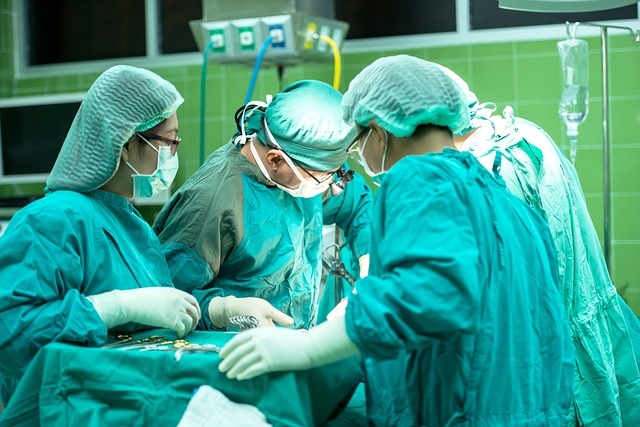Post-operative care is vital for successful healing after surgery, focusing on managing pain, preventing infection, and optimal wound care. Regenerative medicine, leveraging cellular and tissue technologies, minimizes scarring and enhances recovery, particularly for complex wounds. Essential components include monitoring, pain control, wound management, dietary adjustments, stress reduction, and physical activity, guided by healthcare providers to revolutionize post-op protocols. Key regenerative techniques like PRP and MSCs offer faster healing, reduced scarring, and improved function in various surgical specialties.
Healing and reducing scarring are critical components of any surgical procedure. In this article, we explore innovative regenerative methods that support post-operative care, accelerating and enhancing tissue repair. We delve into the science behind these approaches, including the role of regenerative medicine in minimizing scarring, advanced techniques for optimal healing, and natural strategies proven effective through case studies. Understanding post-operative care is key to unlocking faster recovery and improved outcomes, making these methods essential tools for healthcare professionals.
- Understanding Post-Operative Care: The Cornerstone of Healing
- The Role of Regenerative Medicine in Minimizing Scarring
- Advanced Techniques for Optimizing Tissue Repair
- Natural Strategies to Enhance the Healing Process
- Case Studies: Successful Regenerative Approaches in Practice
Understanding Post-Operative Care: The Cornerstone of Healing

Post-operative care is a critical component in any surgical procedure, and it forms the very cornerstone of successful healing. It involves a comprehensive set of practices designed to optimize recovery, reduce complications, and minimize scarring. This period, often overlooked, is when the body initiates its natural healing process, and the right support can significantly influence outcomes.
A crucial aspect of post-operative care includes managing pain, controlling infection, and maintaining proper wound care. This ensures that the body can focus on repair without external disturbances. In the context of regenerative methods, which aim to stimulate tissue regeneration, post-op care becomes even more vital. It involves adhering to specific guidelines, such as rest, elevation, and ice application, alongside administering prescribed medications. These measures create an environment conducive to healing, reducing the risk of scarring and promoting optimal recovery.
The Role of Regenerative Medicine in Minimizing Scarring

Regenerative medicine offers promising avenues for minimizing scarring, particularly in the context of post-operative care. By harnessing the body’s inherent healing capabilities, this innovative approach aims to restore tissue function and promote healthy skin regeneration. Techniques such as cell therapy, tissue engineering, and growth factor applications work synergistically to create an optimal environment for wound healing, reducing the formation of abnormal scar tissue.
In post-operative settings, regenerative medicine can be particularly beneficial in addressing complex wounds, burns, and surgical incisions prone to scarring. Through targeted interventions, these methods encourage the growth of new, healthy cells while modulating the body’s inflammatory response. This not only minimizes visible scarring but also improves overall functional recovery, offering patients a more aesthetically pleasing and comfortable healing experience.
Advanced Techniques for Optimizing Tissue Repair

Natural Strategies to Enhance the Healing Process

In the realm of post-operative care, natural strategies play a pivotal role in enhancing healing and reducing scarring. Incorporating holistic approaches such as dietary adjustments, stress management techniques, and regular physical activity can significantly accelerate the recovery process. A balanced diet rich in antioxidants, vitamins, and minerals not only supports overall health but also fosters optimal wound healing. Antioxidants help combat inflammation and oxidative stress, while essential nutrients promote tissue regeneration and strengthen the immune system.
Additionally, managing stress levels through mindfulness practices like meditation or yoga can positively impact healing. Chronic stress hinders the body’s natural healing mechanisms by releasing hormones that constrict blood vessels and slow down cellular repair. Conversely, stress reduction techniques encourage a state of relaxation, allowing the body to redirect its energy towards mending and rejuvenating itself. Regular physical activity, within the confines of post-operative guidelines, also contributes to improved circulation, reduced stiffness, and enhanced overall well-being, ultimately aiding in the healing process.
Case Studies: Successful Regenerative Approaches in Practice

Regenerative medicine has shown remarkable potential in enhancing healing and minimizing scarring, particularly in various surgical procedures. Case studies have demonstrated the efficacy of these innovative approaches across different fields. For instance, in plastic and reconstructive surgery, regenerative techniques such as platelet-rich plasma (PRP) therapy have been successfully employed to accelerate wound healing and promote tissue regeneration. PRP contains high concentrations of growth factors that stimulate cellular activity, leading to faster recovery times and improved cosmetic outcomes post-operatively.
Another compelling example is its application in orthopaedic surgeries. Regenerative therapies, including bone marrow-derived mesenchymal stem cells (MSCs), have been utilized to treat chronic tendon injuries and ligament tears. MSCs possess multi-potent capabilities, enabling them to differentiate into various cell types required for tissue repair. These cases showcase how regenerative methods can revolutionize post-operative care, offering patients faster healing, reduced scarring, and improved functional recovery.
Post-operative care, as highlighted throughout this article, is a critical component of any surgical procedure. The integration of regenerative medicine methods offers a promising avenue for enhancing healing and minimizing scarring. Advanced techniques, combined with natural strategies, provide a holistic approach to optimize tissue repair. By understanding the cornerstone principles of post-operative care and exploring these innovative methods, healthcare professionals can facilitate successful patient outcomes and improve overall quality of life.
